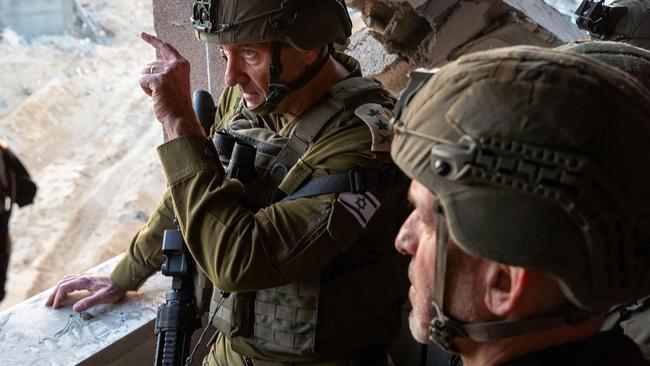‘Lack of trust’: Netanyahu seeks to dismiss Shin Bet chief Ronen Bar
Benjamin Netanyahu’s effort to remove Ronen Bar as director of Shin Bet comes as the security service investigates close aides of the prime minister.

Israeli Prime Minister Benjamin Netanyahu has confirmed he will seek to dismiss the head of the internal security service this week, deepening a power struggle focused largely on who bears responsibility for the Hamas attack that sparked the war in Gaza.
Mr Netanyahu’s effort to remove Ronen Bar as director of the Shin Bet comes as the security service investigates close aides of the prime minister. Mr Netanyahu said he has had “ongoing distrust” with Mr Bar, and “this distrust has grown over time.”
Mr Bar responded by saying he planned to continue in the post for the near future, citing “personal obligations” to finish “sensitive investigations,” free the remaining hostages in Gaza and prepare potential successors.
“I took responsibility for the agency’s part (in failing to prevent the attack) … it is clear that the intent behind my dismissal is not related to October 7,” Mr Bar wrote in a statement. “The prime minister’s expectation of a personal loyalty that contradicts the public interest is an entirely improper expectation.”
But he emphasised that he would respect any legal decision regarding his tenure.
Israel’s attorney general said Mr Netanyahu must clarify the legal basis for his decision before taking any action.
Shin Bet is responsible for monitoring Palestinian militant groups, and recently issued a report accepting responsibility for its failures around the Oct. 7, 2023, Hamas attack. It also criticised Mr Netanyahu, saying failed government policies helped create the climate that led to it.
While the army concluded in a recent report that it underestimated Hamas’ capabilities, Shin Bet said it had a “deep understanding of the threat.” In veiled criticism of the government, the agency said its attempts to thwart the threat were not implemented.
“The investigation reveals a long and deliberate disregard from the political leadership from the organisation’s warnings,” Mr Bar ’s statement said.
Mr Netanyahu has resisted calls for an official state commission of inquiry into the Oct. 7 attack and has tried to blame the failures on the army and security agencies. In recent months, a number of senior security officials, including a defence minister and army chief, have been fired or forced to step down.
Mr Bar has been one of the few senior security officials since the Oct. 7 attack to remain in office.
Announcing his decision to force Mr Bar out, Mr Netanyahu said: “We are in the midst of a war for our very existence … during such an existential war, there must be complete trust between the prime minister and the head of the Shin Bet.
“I have had a persistent lack of confidence in the head of the Shin Bet, a distrust that has only grown over time.”
He said Mr Bar’s dismissal “is necessary to restore the organisation, achieve all our war objectives, and prevent the next disaster.” Mr Bar’s term is due to expire in October 2026.
If successful in removing him, Mr Netanyahu would be expected to appoint a loyalist in his place, slowing any momentum for the commission of inquiry. The prime minister said removing him would help Israel “achieve its war goals and prevent the next disaster.” Mr Netanyahu’s proposed resolution for Mr Bar ’s dismissal would need the approval of parliament, the Knesset, and it is likely he has support to pass it.
However, a personnel decision of this magnitude must get the attorney general’s approval, said Amichai Cohen, a senior research fellow at the Israel Democracy Institute think tank.
In her letter to Mr Netanyahu warning he could not go ahead without clarification, Attorney-General Gali Baharav-Miara added that he should “pay attention to the fact that the role of the Shin Bet is not to serve the personal trust of the prime minister,” according to a statement from her office.
The two have a combative relationship, with the prime minister accusing Ms Baharav-Miara of meddling in government decisions. Earlier this month, Justice Minister Yariv Levin, one of Mr Netanyahu’s biggest supporters, initiated the process of firing her.
Mr Cohen also called Mr Netanyahu’s decision “very problematic.” He said it illustrates the conflict of interest regarding the Shin Bet findings around the Oct. 7 attack and the agency’s investigations into connections between the prime minister’s office and Qatar, a mediator in talks on the war in Gaza.
Mr Netanyahu is angry that the Shin Bet is investigating members of his staff for their dealings with Qatar.
Eli Feldstein, Mr Netanyahu’s former spokesperson, was reported by Israel’s Channel 12 to have worked for a Doha-based firm that recruited Israeli journalists to write pro-Qatar stories. Israel’s left-leaning daily, Haaretz, has reported that two other Netanyahu staffers, Jonatan Urich and Yisrael Einhorn, allegedly built a campaign to bolster Qatar’s image ahead of the 2022 World Cup there.
The Shin Bet, and Mr Bar, have been closely involved with the Gaza hostage negotiations. Mr Netanyahu recently removed Mr Bar from the negotiating team and replaced him with a loyalist, Cabinet minister Ron Dermer. Israeli media have reported on policy differences between the negotiators, who have pushed for a hostage deal, and Mr Netanyahu, who threatens to resume the war.
AFP, AP



To join the conversation, please log in. Don't have an account? Register
Join the conversation, you are commenting as Logout